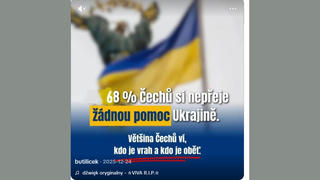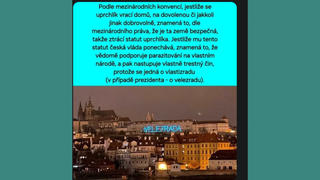

Is postal voting a scam that the Czech government wants to exploit and change the election law before the next parliamentary elections in 2025? No, that's not true: It is a legitimate way of voting that is used in many countries, and the Czech government wants to introduce it only to simplify the procedure for Czechs living abroad who may have to travel thousands of kilometers to cast their vote.
The claim appeared in a video (archived here) on TikTok on December 20, 2023. It contained a screenshot of a commentary published on the website of the Czech daily iDnes. The text (translated from Czech to English by Lead Stories staff) read: "Voting by mail is a fraud that the government wants to exploit." The captions read (as translated):
The postal vote is the biggest scam where they can control the vote as they wish
You can change what you want in the PC, this is what they want, more fraud
This is what the video looked like at the time of writing:
(Source: TikTok screenshot taken on Wed Jan 15 13:36:54 2024 UTC)
In January 2024, the Czech government approved (archived here) a bill to introduce postal voting (archived here) for Czechs living abroad. The bill would permit postal voting for citizens living abroad who are registered on special voter lists at the respective Czech embassies. While the bill has received the government's approval, it still awaits the parliamentary vote for official adoption, which is scheduled for its first reading in parliament during the January session.
If passed, this legislation would alleviate the considerable burden on citizens living abroad, particularly those in countries like the United States or Australia, who currently have to travel vast distances (archived here) to cast their ballots. By embracing postal voting, the government aims to streamline the electoral process, making it more accessible and convenient for those unable to participate in person.
The current Czech government, a coalition comprised of five parties under the leadership of the Civic Democrats, incorporated the proposal in its agenda (archived here) when it took office in December 2021. The bill would not allow postal voting for citizens in the Czech Republic and does not include an option to vote electronically via personal computer.
The analysis featured in the video on TikTok, written by lawyer Jan Kudrna, was published on the iDnes website (archived here) on December 20, 2023. Kudrna, a consistent critic of this initiative, has a history of challenging the voting rights of expatriates, as reported by Aktualne.cz (archived here), a Czech news website, in 2018. There are doubts about whether this amendment aligns with the current Czech constitution and whether it might infringe upon the rights of other citizens (archived here). Any potential appeal would be adjudicated by the Czech Constitutional Court (archived here).
Postal voting is a lawful means of casting ballot papers in numerous countries. In many member states of the European Union, including but not limited to citizens residing abroad (archived here), postal voting is accessible upon request. This method is also utilized in other nations like the United Kingdom, the United States and Australia.
The potential impact of this move on the number of overseas voters participating in elections, as well as their political preferences, remains unclear. In the second round of the Czech presidential election in 2023, the Czech Statistical Office reported that 22,996 voters cast their ballots abroad (archived here), constituting a fraction of the 5,759,199 total votes.
The initiative stirred political controversy in the United States when former President Donald Trump repeatedly denounced such voting (archived here). In 2020, various U.S. states employed this method to curb the spread of the COVID-19 pandemic, with Trump characterizing it as an open invitation to fraud.
Lead Stories has previously debunked a claim suggesting that the junior coalition partner TOP 09, which advocated for the implementation of absentee voting even before joining the cabinet, is aiming to introduce it as a strategy to maintain power.








